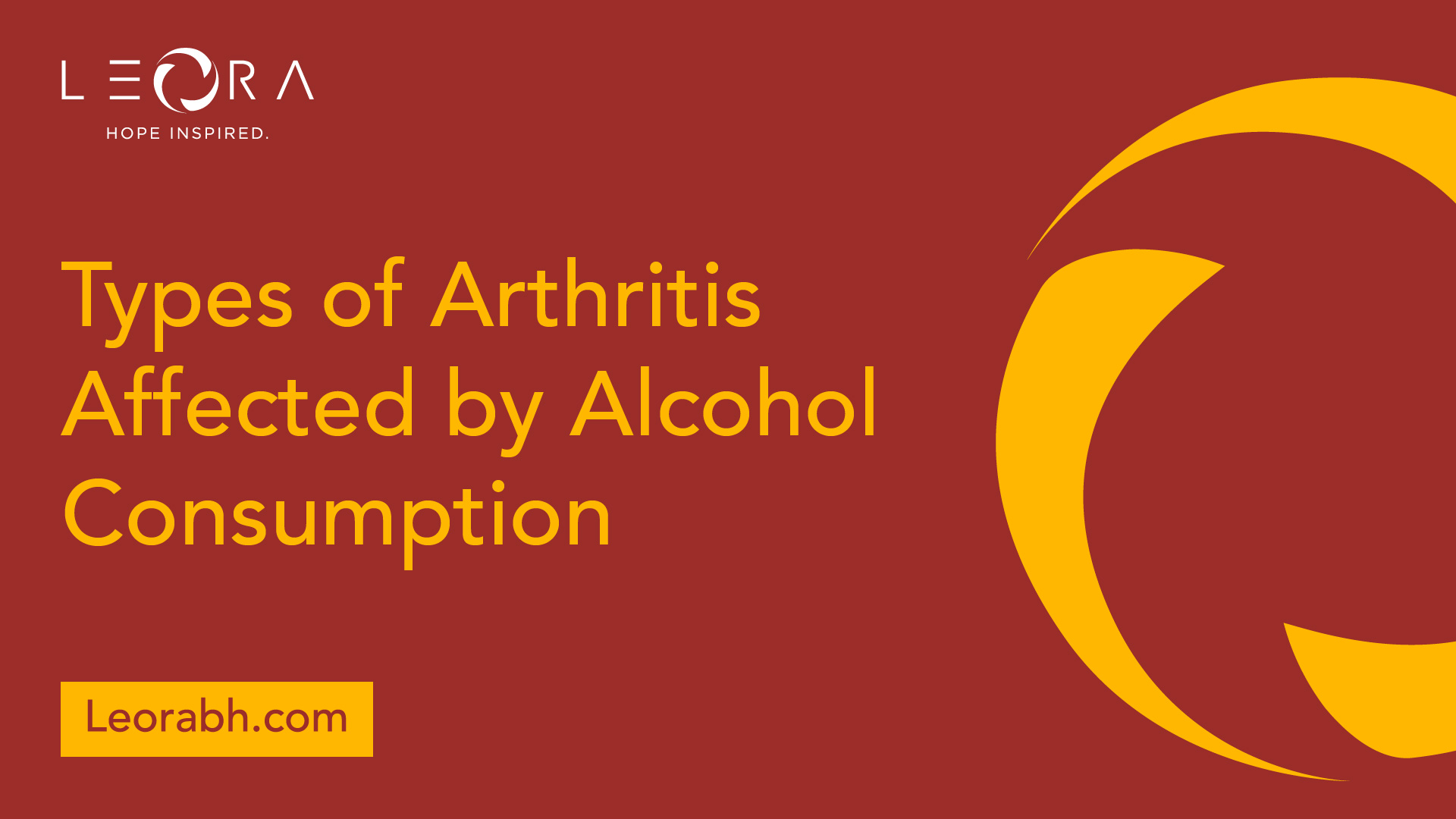Alcohol and Arthritis: How Alcohol Affects Arthritis
Discover the impact of alcohol on arthritis symptoms. From inflammation to joint damage, understand the connection between alcohol and arthritis.
The Relationship Between Alcohol and Arthritis
When it comes to the relationship between alcohol and arthritis, understanding the impact of alcohol consumption on arthritis is crucial. Arthritis refers to a group of conditions that cause inflammation and pain in the joints. It affects millions of people worldwide and can significantly impact their quality of life. Let's take a closer look at arthritis and the effects of alcohol on this condition.

Understanding Arthritis
Arthritis is a broad term used to describe various conditions that affect the joints and surrounding tissues. The most common types of arthritis include osteoarthritis, rheumatoid arthritis, gout, and psoriatic arthritis. While each type of arthritis has its own unique causes and symptoms, they all involve joint inflammation and can lead to pain, stiffness, and reduced mobility.
The Impact of Alcohol on Arthritis
The impact of alcohol consumption on arthritis is a topic of ongoing research. While moderate alcohol consumption, particularly red wine, has been associated with potential health benefits in some studies, excessive or chronic alcohol intake can have negative effects on arthritis.
Alcohol consumption may worsen arthritis symptoms and contribute to increased joint pain, inflammation, and damage. It can also interfere with medication effectiveness, potentially reducing the benefits of arthritis treatments. Furthermore, certain types of arthritis, such as gout, are directly linked to alcohol consumption. Increased alcohol intake can trigger gout attacks by raising uric acid levels in the body.
It's important to note that the effects of alcohol on arthritis can vary between individuals. Factors such as the type of arthritis, overall health, and the amount of alcohol consumed can influence the relationship. Consulting with a healthcare provider is crucial for understanding how alcohol may specifically impact your arthritis condition.
By staying informed about the relationship between alcohol and arthritis, individuals with arthritis can make more informed decisions regarding their alcohol consumption. It's important to consider moderation and potential risk reduction strategies when it comes to alcohol intake and arthritis. To learn more about recommended alcohol consumption guidelines and tips for managing arthritis and alcohol intake, continue reading the next section.

Types of Arthritis Affected by Alcohol Consumption
Alcohol consumption can have varying effects on different types of arthritis. While there is no definitive consensus, research suggests that certain types of arthritis may be influenced by alcohol intake. Two types of arthritis that are commonly associated with alcohol consumption are rheumatoid arthritis and gout.
Rheumatoid Arthritis
Rheumatoid arthritis is an autoimmune disease characterized by chronic inflammation of the joints. It occurs when the immune system mistakenly attacks the body's own tissues, primarily affecting the joints. While the exact cause of rheumatoid arthritis is unknown, research indicates that alcohol consumption may play a role in the development and progression of the disease.
Studies have shown that heavy alcohol consumption, particularly over an extended period, may increase the risk of developing rheumatoid arthritis. Additionally, alcohol consumption in individuals with existing rheumatoid arthritis may exacerbate symptoms and lead to increased joint inflammation. However, it's important to note that the relationship between alcohol and rheumatoid arthritis is complex and can vary from person to person.
Gout
Gout is a type of arthritis characterized by sudden and severe pain, swelling, and tenderness in the joints. It is caused by the accumulation of uric acid crystals in the joints, leading to inflammation and discomfort. Alcohol consumption, particularly beer and liquor, has been linked to an increased risk of developing gout and triggering gout attacks.
Alcohol can contribute to gout in several ways. Firstly, it can increase the production of uric acid in the body and decrease its excretion, leading to elevated uric acid levels. Secondly, alcohol can dehydrate the body, further promoting the accumulation of uric acid crystals. Lastly, certain alcoholic beverages, such as beer, contain high levels of purines, which can increase uric acid production.
Understanding the potential impact of alcohol on specific types of arthritis is important for individuals with arthritis who want to manage their symptoms effectively. It's essential to consult with a healthcare provider for personalized advice and recommendations regarding alcohol consumption and arthritis. By working closely with a healthcare professional, individuals can make informed decisions about their lifestyle choices and develop strategies to minimize the impact of arthritis on their daily lives.

How Alcohol Affects Arthritis Symptoms
Alcohol consumption can have various effects on arthritis symptoms, including inflammation and pain, joint damage and degeneration, as well as potential interactions with arthritis medications. Understanding these effects is crucial for individuals with arthritis who may be considering their alcohol intake.
Inflammation and Pain
One of the primary ways alcohol can affect arthritis is by promoting inflammation and exacerbating pain. Alcohol is known to trigger the release of pro-inflammatory substances in the body, leading to increased joint inflammation. This can result in heightened pain, swelling, and stiffness in individuals with arthritis.
It's important to note that alcohol affects different types of arthritis in varying ways. For instance, the link between alcohol consumption and rheumatoid arthritis has been extensively studied. Studies suggest that alcohol may worsen the disease activity and contribute to increased joint inflammation.
Joint Damage and Degeneration
Excessive alcohol consumption can also contribute to joint damage and degeneration in individuals with arthritis. Alcohol abuse can lead to nutritional deficiencies, especially in vitamins and minerals crucial for joint health. These deficiencies can impair the body's ability to repair and maintain healthy joints, potentially accelerating joint damage in conditions like osteoarthritis.
Moreover, alcohol can interfere with the body's production of collagen, a protein essential for maintaining the structure and integrity of joints. This disruption can further contribute to joint breakdown and worsening of arthritis symptoms.
Medication Interactions
Another aspect to consider is the potential interaction between alcohol and arthritis medications. Alcohol can interfere with the effectiveness and safety of certain medications used to manage arthritis symptoms. For example, alcohol consumption while taking nonsteroidal anti-inflammatory drugs (NSAIDs) can increase the risk of stomach ulcers and gastrointestinal bleeding.
Additionally, some medications prescribed for arthritis, such as disease-modifying antirheumatic drugs (DMARDs), may have specific warnings against alcohol consumption due to potential liver toxicity. It is crucial to consult with a healthcare provider or pharmacist to understand how alcohol may interact with prescribed medications.
Understanding the impact of alcohol on arthritis symptoms is essential for individuals with arthritis who want to manage their condition effectively. While moderate alcohol consumption may be considered safe for some individuals, it's crucial to consult with a healthcare provider to determine what is best for your specific situation.
Moderation and Risk Reduction
When it comes to alcohol consumption and arthritis, moderation is key. While excessive alcohol intake can have detrimental effects on arthritis symptoms and overall health, moderate consumption may have less impact. Here are some recommended alcohol consumption guidelines and tips for managing arthritis and alcohol intake.
Recommended Alcohol Consumption Guidelines
The recommended alcohol consumption guidelines vary depending on the country and organization providing the recommendations. In the United States, the Centers for Disease Control and Prevention (CDC) suggests the following guidelines for moderate alcohol consumption:
Here are the maximum number of drinks per day and per week for men and women:
- Men: 2 drinks per day, 14 drinks per week
- Women: 1 drink per day, 7 drinks per week
It's important to note that these guidelines apply to individuals without underlying health conditions, and they may not be suitable for everyone. Individuals with arthritis should consult with their healthcare provider to determine the appropriate level of alcohol consumption based on their specific condition and overall health.
Tips for Managing Arthritis and Alcohol Intake
For individuals with arthritis who choose to consume alcohol, there are several tips that can help minimize the potential impact on their symptoms:
- Know your limits: Understand your body's tolerance to alcohol and be aware of your limits. Pay attention to how alcohol affects your arthritis symptoms and adjust your consumption accordingly.
- Stay hydrated: Drinking alcohol can contribute to dehydration, which may worsen arthritis symptoms. Ensure you drink plenty of water alongside any alcoholic beverages to stay hydrated.
- Choose your drinks wisely: Some alcoholic beverages, such as beer and certain cocktails, may be more likely to trigger arthritis symptoms due to their ingredients or high purine content. Opt for drinks with lower purine levels, such as wine or spirits, if you find they have less impact on your symptoms.
- Avoid binge drinking: Excessive alcohol consumption, particularly in the form of binge drinking, can lead to increased inflammation and greater symptom severity. Pace yourself and avoid consuming large amounts of alcohol in a short period.
- Consider alternative beverages: If you find that alcohol exacerbates your arthritis symptoms, consider exploring non-alcoholic alternatives. There are various mocktails and alcohol-free options available that can still provide a pleasurable drinking experience.
- Monitor medication interactions: Some arthritis medications may interact negatively with alcohol. Consult with your healthcare provider to understand any potential interactions and the impact they may have on your treatment plan.
It's crucial to remember that while moderate alcohol consumption may be acceptable for some individuals with arthritis, others may find that even small amounts of alcohol worsen their symptoms. It's always best to consult with a healthcare provider to assess individual circumstances and receive personalized advice.
By following these recommended guidelines and implementing strategies for managing alcohol intake, individuals with arthritis can make informed choices that align with their overall health goals and minimize any potential negative effects.
Seeking Professional Advice
When it comes to understanding the relationship between alcohol and arthritis, it is essential to seek professional advice. Consulting with a healthcare provider can provide valuable insights and personalized recommendations based on your specific situation. Additionally, exploring alternative beverages can help you make informed choices that support your arthritis management.
Consulting with a Healthcare Provider
If you have arthritis and are concerned about the impact of alcohol on your condition, it is advisable to consult with a healthcare provider, such as a rheumatologist or primary care physician. They can evaluate your overall health, consider any medications you may be taking, and provide guidance on the potential effects of alcohol on your arthritis symptoms.
During your consultation, it is important to be open and honest about your alcohol consumption habits. This will help your healthcare provider assess the potential risks and benefits of alcohol in relation to your arthritis. They may recommend certain restrictions or modifications to your alcohol intake based on your specific situation.
Your healthcare provider can also address any concerns you may have regarding alcohol and its impact on joint pain, inflammation, and specific types of arthritis. They can provide information on the latest research findings and offer practical advice to help you make informed decisions about your alcohol consumption. Remember, the recommendations may vary depending on the type and severity of your arthritis, so it is crucial to have an individualized discussion with your healthcare provider.
Exploring Alternative Beverages
If you are advised to limit or avoid alcohol due to your arthritis, there are plenty of alternative beverages to consider. These alternatives can provide enjoyable options while minimizing the potential negative effects on your condition. Here are some alternatives to alcohol that you may find appealing:
- Water: Staying hydrated is essential for overall health and joint function. Drinking an adequate amount of water throughout the day can help flush out toxins and promote joint lubrication.
- Herbal teas: Herbal teas offer a soothing and flavorful alternative to alcoholic beverages. They come in a wide variety of flavors and can provide relaxation and comfort without the potential negative effects of alcohol.
- Fruit-infused water: Adding fresh fruits, such as berries or citrus slices, to your water can create a refreshing and flavorful drink. This can be a great way to increase your water intake while enjoying a burst of natural flavors.
- Mocktails: Mocktails are non-alcoholic versions of cocktails, often made with a combination of juices, sparkling water, and garnishes. These creative and colorful drinks can be a fun and festive alternative to alcoholic beverages during social gatherings.
By exploring alternative beverages, you can still enjoy social occasions and flavorful drinks while prioritizing your arthritis management. Be sure to consult with your healthcare provider to ensure that the alternatives you choose align with your specific needs and health goals.
Remember, the guidance and recommendations of a healthcare provider are invaluable when it comes to understanding the effects of alcohol on your arthritis. They can provide personalized advice, taking into account your unique medical history and current condition. By working together with your healthcare provider and making informed choices, you can find the right balance that supports your overall well-being and arthritis management.
Sources
Find Your Inner Light
Related Articles
Contact Us
Leora Behavioral Health offers a comprehensive addiction treatment programs to help you get your life back on track.
Our trained professionals will work with you to develop a personalized treatment plan that meets your unique needs. If you or someone you know is struggling with addiction, reach out to Leora Behavioral Health today.


.svg)





.svg)
.svg)
.svg)
.svg)